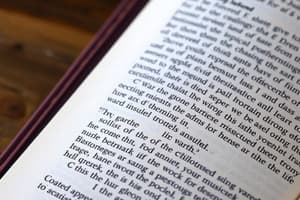Podcast
Questions and Answers
Reading comprehension is the ability to understand, interpret, and analyze written ______.
Reading comprehension is the ability to understand, interpret, and analyze written ______.
text
The ability to recognize words and understand their meanings is known as ______.
The ability to recognize words and understand their meanings is known as ______.
decoding
To enhance engagement and retention, one should ask questions before, during, and after ______.
To enhance engagement and retention, one should ask questions before, during, and after ______.
reading
Creating mental images of the information presented in the text is referred to as ______.
Creating mental images of the information presented in the text is referred to as ______.
Standardized tests measure comprehension through multiple-choice questions, short answers, and ______.
Standardized tests measure comprehension through multiple-choice questions, short answers, and ______.
Poor ______ can lead to a loss of meaning when reading.
Poor ______ can lead to a loss of meaning when reading.
One common challenge in reading comprehension is difficulty with vocabulary and unfamiliar ______.
One common challenge in reading comprehension is difficulty with vocabulary and unfamiliar ______.
Reading comprehension enhances critical thinking and analytical ______.
Reading comprehension enhances critical thinking and analytical ______.
Flashcards are hidden until you start studying
Study Notes
Definition
- Reading comprehension is the ability to understand, interpret, and analyze written text.
Key Components
- Decoding: Ability to recognize words and understand their meanings.
- Vocabulary Knowledge: Understanding the meanings of words and phrases.
- Fluency: The ability to read text smoothly and quickly.
- Text Structure Awareness: Recognizing how different types of texts (narrative, expository) are organized.
- Inference Making: Drawing conclusions and making predictions based on the text.
- Monitoring Comprehension: Self-assessing understanding and adjusting strategies as needed.
Strategies for Improvement
- Previewing: Skim the text to get an overview of content and structure.
- Questioning: Ask questions before, during, and after reading to enhance engagement and retention.
- Visualizing: Create mental images of the information presented in the text.
- Summarizing: Regularly pause to summarize key points in your own words.
- Clarifying: Identify and resolve any confusion about the text.
- Connecting: Relate the text to prior knowledge or personal experiences.
Assessment Methods
- Standardized Tests: Measure comprehension through multiple-choice questions, short answers, and essays.
- Reading Logs: Track reading habits and reflections.
- Oral Retellings: Have readers summarize the text aloud to assess understanding.
Factors Influencing Comprehension
- Reader Factors: Background knowledge, interest, motivation, and cognitive skills.
- Text Factors: Complexity, length, genre, and clarity of the text.
- Contextual Factors: Environment, purpose for reading, and social interactions.
Common Challenges
- Difficulty with vocabulary and unfamiliar phrases.
- Poor fluency leading to loss of meaning.
- Lack of background knowledge related to the text topic.
- Overlooking text features (headings, subheadings, graphics).
Importance
- Enhances critical thinking and analytical skills.
- Essential for academic success and lifelong learning.
- Supports effective communication and engagement with various texts.
Definition
- Reading comprehension: The ability to understand, interpret, and analyze written text.
Key Components
- Decoding: Recognizing words and comprehending their meanings.
- Vocabulary Knowledge: Understanding definitions and usages of words and phrases.
- Fluency: Reading text rapidly and smoothly without losing comprehension.
- Text Structure Awareness: Recognizing organization in different text types (narrative vs. expository).
- Inference Making: Drawing logical conclusions and making predictions based on textual information.
- Monitoring Comprehension: Self-assessment strategies to ensure understanding and adjust reading methods accordingly.
Strategies for Improvement
- Previewing: Skimming to grasp the overall content and structure before in-depth reading.
- Questioning: Engaging with the text by posing questions throughout the reading process.
- Visualizing: Forming mental images to aid understanding and retention of the material.
- Summarizing: Regularly recapping key points in personal words to reinforce memory.
- Clarifying: Identifying confusion and seeking clarification to ensure comprehension.
- Connecting: Linking the text to existing knowledge or personal experiences to enhance meaning.
Assessment Methods
- Standardized Tests: Evaluating comprehension through formats like multiple-choice, short answers, and essays.
- Reading Logs: Keeping records of reading habits and personal reflections to track progress.
- Oral Retellings: Summarizing the text aloud as a method of measuring understanding.
Factors Influencing Comprehension
- Reader Factors: Individual background knowledge, interest level, motivation, and cognitive abilities.
- Text Factors: The complexity, length, genre, and overall clarity of the text.
- Contextual Factors: The reading environment, purpose of reading, and social interactions influencing comprehension.
Common Challenges
- Difficulty grasping vocabulary and encountering unfamiliar phrases.
- Inadequate fluency resulting in a diminished understanding of the text.
- Limited background knowledge relevant to the text topic can hinder comprehension.
- Neglecting important text features such as headings, subheadings, and graphics.
Importance
- Critical for developing analytical thinking skills.
- Essential for academic achievement and lifelong learning opportunities.
- Supports effective communication and interaction with diverse written material.
Studying That Suits You
Use AI to generate personalized quizzes and flashcards to suit your learning preferences.




